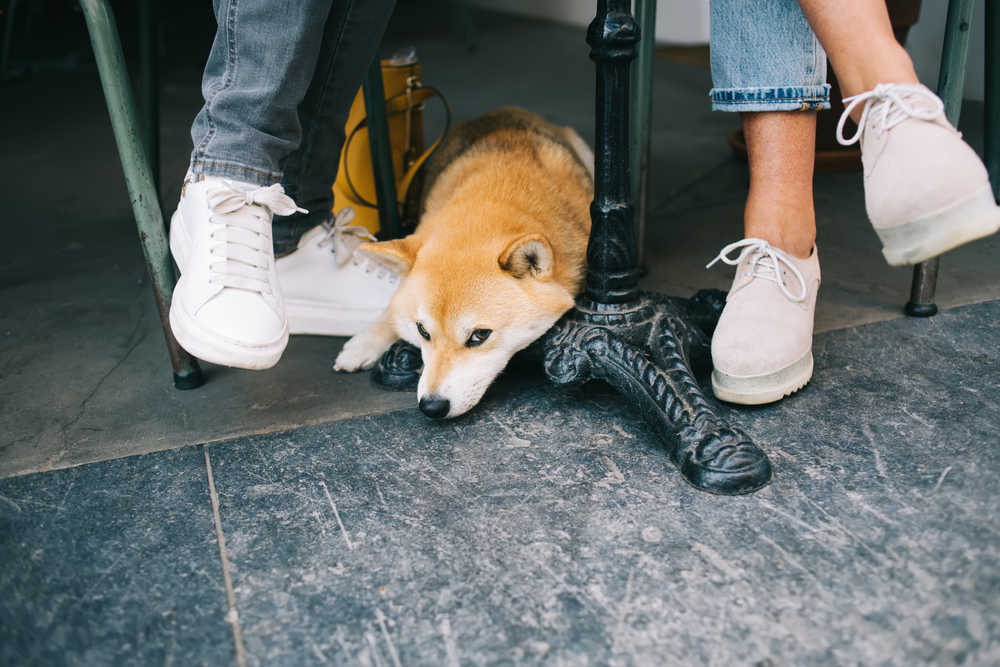6 Pet-Proofing Points from Percy

Percy the Kitten: “I squinted as my surroundings slowly came into focus. They pulled my breathing tube, and wrapped me in a warm towel on a heating pad. I shivered a little, but the pain was gone. They had removed the string, along with three inches of damaged intestine, and stitched up my abdomen.”
Percy the kitten’s experience is, unfortunately, a common one. Home should be a safe haven for pets, but many household items—a string toy in Percy’s case—pose serious dangers. Whether you have a curious new kitten or an aging senior pet, Bayside Animal Hospital urges you to prevent pet problems and emergencies. Read on for Percy’s recommendations, learned from experience, for pet-proofing your home.
#1: Take care with toys: Supervise pets around strings and cords
Percy: “I loved chasing the string-mouse toy through the house. One day I was bored, so I chewed and swallowed the whole toy. The string cut through my intestines, and the mouse became lodged in my stomach. It hurt.”
Pets can’t resist strings, from window treatment cords to phone-charger cables. Keep these items out of pets’ reach to avoid electrical shock, a strangulation hazard, and risk of a foreign object in the intestines that likely will require emergency surgery.
#2: Plants and flowers: Not things of beauty for pets
Percy: “Cats like to chew grass, and lilies look like grass to me, but I learned that they are extremely dangerous, especially for cats, and my owners keep them out of my reach.”
Provide safe cat grass to deter cats from chewing toxic plants. In addition to lilies, problem plants for pets include azalea, rhododendron, yew, rhubarb, shamrocks, sago palm, philodendron, peace lilies, and mushrooms.
#3: Beware the bathroom: Lock up cleaning and personal products and medications
Percy: “We pets love to pull open cabinet doors and explore, but these days, they are always locked. I still drink from the toilet, but only occasionally. With medications, I love that mine are flavored, and I want to eat them all at once. And, my owners often drop their pills on the floor, but they usually pick them up before I can get to them.”
Avoid leaving toxic cleansers in the toilet bowl. Bleach, lye, and detergents are all dangerous for pets. Many human personal care items, such as toothpaste and sunscreen, and children’s diaper ointment, also are dangerous for pets. Use the same safety cabinet latches you would use to deter young children.
Many pet medications are flavored, or disguised as chews, and can harm pets who eat too many. Human medications that can be toxic or fatal to pets include nonsteroidal anti-inflammatories (i.e., NSAIDs, such as ibuprofen, naproxen, and aspirin), antidepressants, acetaminophen (i.e., Tylenol), antihistamines, nicotine, marijuana, diet pills, cold medicines, and prescription drugs. Remember, dogs often have no problem chewing through child-proof lids.
#4: Get pets out of the garage: As dangerous as a race track
Percy: “I love to hunt bugs in the garage, but sometimes I find things more scary than the bugs, such as that sweet-smelling stuff called antifreeze.”
Always keep pets away from car and yard maintenance items, such as antifreeze, paint, gasoline, motor oil, herbicides, insecticides, mothballs, and glue traps, which are dangerous, and can be deadly, for pets. Rat and slug bait poisoning are common but avoidable pet emergencies.
#5: Too many cooks: Keep pets out of the kitchen
Percy: “My owners love it when I rub against their legs and purr, but not while they are carrying hot food in the kitchen. And I have learned that so many human foods that taste so good are not good for me. But, I’m bad in that sometimes I cannot resist checking the garbage can. Dogs do it all the time!”
Consider blocking pets from the kitchen, especially while you are cooking. Sharp objects often make their way to the floor. You don’t want to drop a hot dish you are carrying when your cat winds around your feet. Small pets can often jump on counter tops or hot surfaces. Many common foods cause serious pet problems, including xylitol, chocolate, bones, macadamia nuts, coffee, tea, alcohol, yeast dough, garlic, onion, grapes, and raisins.
Unfortunately, pet “garbage-itis” is common, and dangerous, because pets will eat anything they find there, such as cloth, plastic, batteries, coins, and needles, as well as spoiled leftovers. Use a garbage can with a latched lid.
#6: Hide and seek and slip and slide: Watch out for your pet
Percy: “Pets like to rest at your feet, but those recliners can slam down faster than a sleeping pet can react. And I’m still young, but our old dog sure needs help to get through the house these days. I feel sorry for him. I know he does not want to be a burden, but eventually we all need help.”
Many pets like to hide, but can put themselves at risk for physical injury in places they commonly choose. Don’t let your pet sleep under chairs or in cabinets. Outdoor cats often climb under car hoods in cold weather, so always knock on the hood to shoo cats away before starting your engine.
Senior pets, especially, become a concern for slipping and falling. Pet booties and non-slip rugs help on hardwood and other slick floors. Use baby gates to confine them to safe areas and to block off stairs. Consider stools and ramps for pets with joint stiffness and decreased mobility.
We agree with Percy’s pet-proofing points. Call Bayside Animal Hospital for more information on pet-proofing your home and yard. Prevent pet problems, and you’ll have more time to practice Percy’s number one request—Take more time to play with your pet!


